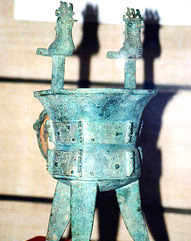| Legole.Com Discover china. Explore the beauty and wonder of the land, people, and culture of China. |
 |
|
|
 |
| |
 After defeating the Shang, King Wu founded the Zhou Dynasty, making Haojing his capital city, near the present city of Xian in Shaanxi Province. Historians call this period Western Zhou Dynasty (the 11th century BC - 771 BC). After defeating the Shang, King Wu founded the Zhou Dynasty, making Haojing his capital city, near the present city of Xian in Shaanxi Province. Historians call this period Western Zhou Dynasty (the 11th century BC - 771 BC).
Political History
Like the Shang kings, the Zhou kings worshipped their ancestors, but they also worshipped Heaven. The Shujing (Book of History), one of the earliest recorded texts, describes the Zhou's version of their history. It assumes a close relationship between Heaven and the king, calling the king "the Son of Heaven." It explains that Heaven gives the king a mandate to rule so long as he does so in the interest of the people. The last Shang king had been decadent and cruel, so Heaven withdrew the Mandate of Heaven from him and entrusted it to the virtuous Zhou kings.
In order to reassure and pacify the people of Shang and consolidate the new regime, the Western Zhou introduced a feudal system. During the Zhou Dynasty, all the land and people were nominally the property of the king. Kings, as supreme rulers, distributed both land and the people on it to their relatives, meritorious ministers and generals founding many small vassal states. These kingdoms had to comply with the orders issued by Zhou emperors. This entailed providing an army to fight for the emperor and regular payment of tribute and homage to the emperor. Each of these vassals could pass his title down to a son, thus making each domain a hereditary vassal state. Within each state, there were noble houses holding hereditary titles. King Wu's enfeoffment of dukes was the first practice of the feudal system during the Western Zhou Dynasty. Under this system, the Western Zhou Dynasty strengthened its rule and became a powerful slave owning country with vast lands.
Valuable lessons were learned from the collapse of the Shang. Consequently, Zhou established a complex state machinery to effectively control the entire country. Systematic criminal laws were instituted and a larger standing army was maintained than had been under the rule of the Shang Dynasty.
Economy and Society
The Western Zhou made a further achievement in social economy. Slaves were popularly exploited in pursuit of the production of greater surpluses, thereby creating wealth for their owners. Handcrafts progressed in this period and the bronze industry was especially important. Besides the bronze workshops controlled by the central government, the small kingdoms also had foundries of their own. Bronze products greatly increased in quality, quantity and variety so that their use covered nearly all aspects of life. The Western Zhou Chariot Burial Pit unearthed near Xian exemplifies the high technical standard of bronze production of this period.
The development of the bronze industry also promoted the prosperity of other industries. In agriculture, iron tools and the coupling-plough were brought into use for the first time, this greatly enhanced productivity. Bazaars appeared in some larger towns, where silk, weapons, cattle as well as slaves were traded. In addition, script became more widely used. People not only engraved inscriptions on oracle bones, but also engraved epigraphs on thousands of bronze utensils, recording the social life of that time.
Decline of the Western Zhou
The Zhou kings maintained control over their vassals for more than two centuries. Like the Shang, the Western Zhou achieved a flourishing age during its period of rule. However, as generations passed, vassal lords traded and sold land they had acquired from the Zhou kings. This gradual change in ownership created larger more profitable estates. In turn, this strengthened the position of the feudal lords giving them greater autonomy. As the Zhou kings were no longer the sole possessors of the land, the ties of kingship and vassalage inevitably weakened.
Added to this, although Zhou was the most powerful kingdom at the time, it actually didn't rule the whole of China, which then consisted of a number of quasi-independent principalities. During the reign of the Shang and Zhou dynasties, the central plains had reached the peak of the Bronze Age while the neighboring regions lagged behind. In search of more wealth, the Western Zhou launched many wars against those kingdoms. At the same time, the Quanrong, an ancient ethnic group lived in the north-west, constantly harassed the Zhou, becoming the biggest threat to the Zhou Dynasty.
During his reign King You indulged Baosi, one of his concubines, and this engendered a power struggle within the kingdom. The Chinese idioms "A single smile costs one thousand pieces of gold" and "the sovereign rulers are fooled by the beacon fire" have been passed down to us from the King You's reign.
King You's neglect of duty finally led to the fall of the dynasty. In 771 BC when several of the vassals rebelled, the army of the Quanrong ethnic group took its chance, captured Haojing and killed King You. The Western Zhou Dynasty collapsed.
The next year, in 770 BC, King Ping moved the capital to Luoyi (now Luoyang City in Henan Province). This was the start of the Eastern Zhou Dynasty (770 BC - 221 BC).
|
|
|
 |
|
